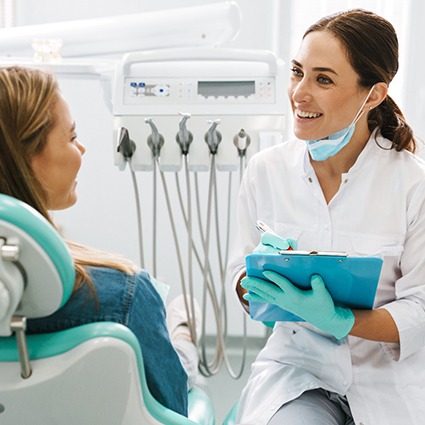Emergency Dentist Rogers
Ready to Help with Unexpected Dental Emergencies

Sometimes life can throw you an unexpected curveball – and when it comes in the form of a dental emergency, you might be a little uncertain about how to handle things. Our team here at Metro Park Dental Arts knows that these situations can be anxiety-inducing and confusing at times, which is why we’re here to help. If you or a loved one needs an emergency dentist, contact our Rogers office for assistance!
Why Choose Metro Park Dental Arts for Emergency Dentistry?
- Same-Day Appointments for New and Existing Patients
- X-Ray and Exam Special for Emergency Patients
- Modern Dental Office with Advanced Technology
I Need a Checkup & Cleaning I am Worried About Gum Disease I Have a Cavity or Broken Tooth I am Missing One or More Teeth I Want to Enhance My Smile I Want a Straighter Smile I am Scared of the Dentist View Our Services
How We Treat Dental Emergencies

We can treat dental emergencies with ease here in our Rogers office. All you’ll need to do is follow these three steps if you’re dealing with a dental disaster:
- Give Us a Call – Dental emergencies should always be handled promptly since things have the tendency to worsen without intervention. Give our office a call and describe your symptoms to us over the phone. We’ll let you know when you need to come in, even if it’s that same day. We’ll also provide you with first-aid tips over the phone.
- Attend Your Appointment – When you’re here, we’ll begin by performing a fast and thorough examination of your mouth. This may include taking X-rays to see the extent of the damage or any hidden issues you might not have noticed. We’ll work quickly to ensure that you’re not in pain for long!
- Receive Urgent Care – Once we’ve seen your smile, we can decide on the best course of action for relieving your pain and mending any damage. These treatment plans are fully customized, so rest assured, no matter the nature of your emergency, we’ll set things right.
The Most Common Dental Emergencies
Even if you’re not experiencing any outright painful symptoms, it’s unwise to shrug things off and assume your smile will be fine – it’s very possible that your lack of pain might be a sign of something severe. We recommend that you give us a call and explain your situation over the phone, and we’ll let you know what to do and when to come in. Here’s a brief list of some of the most common dental emergencies that we can treat here in our Rogers office:
Understanding the Cost of Emergency Dentistry

You, like many other patients, may be hesitant to schedule an appointment because you’re worried about the cost – even if you’re in a lot of pain. Rest assured, our team at MetroPark Dental Arts is here to help you navigate the financial side of the emergency care you need so you aren’t left in the dark or with a surprise bill at the end. If you want to learn a little more about the price before getting in touch, you can read on too!
Why Every Dental Emergency is Different

Treating a small cavity is very different than treating a large crack. Similarly, eliminating an infection is different than replacing a knocked-out tooth. In other words, no two dental emergencies are exactly the same, so the cost varies! Once we pinpoint the root of the problem and the extent of the damage, we will review your treatment options, create your custom treatment plan, and provide you with an estimate of the cost. Then, we will review the financial solutions available, like dental insurance and our in-house savings plan.
Does Dental Insurance Cover Dental Emergencies?

Some dental insurance providers cover an emergency exam each year, some cover between 50% and 80% of the cost of essential restorative care, and some do both! So, it’s definitely worth taking a look at your plan, including if there are any waiting periods, deductibles, or maximums that need to be considered. If you need any help, you can also reach out to us. We’re in-network with Delta Dental, MetLife, Aetna, and several other popular providers.
Other Options for Making Dental Emergencies Affordable

There are three financial solutions we offer outside of dental insurance:
- Our periodic specials – We’re proud to offer our patients special offers to help them save.
- Flexible financing – With CareCredit, you can space out the cost of emergency dentistry into smaller, monthly installments.
- Our in-house membership plan – When you join, you get access to members-only advantages that benefit your smile and wallet.
How Taking Care Of Your Smile Can Save You Money

Remember, cavities, gum disease, and other serious oral health problems won’t go away on their own. So, the best thing to do is call our Rogers dental team when you first notice that something is wrong – whether it’s pain when biting down or blood when you floss. That way, we can intervene with the care you need while your tooth can still be saved.
Outside of that, do your best to commit to good habits, like brushing twice a day, and quit bad ones, including smoking and biting your nails. That way, your teeth and gums stay happy and healthy throughout the years!
Keys to Preventing Dental Emergencies

Rest assured, we’re always just a phone call away when you need us. That said, as your dental team, we want to help you keep your teeth and gums healthy so you hopefully never experience a serious dental injury. With this in mind, read on for a few things you can do to reduce your risk of dental damage.
Visit Your Dentist Every Six Months

Routine dental visits are often looked at as simply a quick check for cavities. In reality, that’s just one small component! In addition to your dentist screening for oral cancer, gum disease, damaged restorations, and warning signs of trouble, your dental hygienist removes plaque and tartar before these harmful substances wreak havoc on your oral health. So, if you want a healthy smile, you need to prioritize your routine checkups and cleanings.
Maintain Good Oral Hygiene At Home

Consistently taking care of your smile at home is key. That starts with habits like brushing your teeth each morning and extends to flossing your teeth each night before you go to sleep (even if you had a long day and your bed is calling your name). Additionally, rinse with an ADA-approved mouthwash, replace your toothbrush every 3-4 months, and clean your toothbrush holder regularly.
Don’t Over-Indulge on Sugary and Starchy Snacks

Although sugary and starchy foods can be enjoyed in moderation, they should not be eaten in excess since that increases your risk of tooth decay. Instead, we recommend focusing on what you can add to your diet that will benefit your oral and overall health, like fresh fruits and seasonal vegetables. It’s also important to drink plenty of water. In addition to keeping you hydrated, this will help prevent dry mouth.
Wear a Mouthguard to Protect Your Teeth

Do you enjoy starting your morning with a run or ending your evening with a weight-lifting session? Maybe you joined a football team or ultimate frisbee group to stay active and catch up with friends. Whatever the case may be, you need to wear a mouthguard. That way, your smile is protected from unforeseen impact from a bad fall, an accidental elbow to the face, or something similar.
Important note: If you grind/clench your teeth while you sleep, we recommend wearing a nightguard too!
Break Bad Habits

Biting your nails may seem like a harmless habit, but it can create small chips and cracks, increasing your risk of a serious dental injury. For the same reason, we don’t recommend chewing on ice cubes, biting on the back of your pen/pencil, using your teeth as tools to open things, or smoking. Basically, you want to avoid doing anything that increases your chances of winding up needing emergency dental care.
Dental Emergency FAQs
Will a Toothache Go Away on Its Own?
It’s possible, yes! However, it’s not the good news you think it is. In fact, if your toothache goes away after weeks, months, or years of causing problems, it’s likely because the nerve has died. Although this will result in your symptoms going away, your tooth is still compromised. For this reason, it’s as important as ever that you schedule an appointment with our emergency dentist so they can assess the severity of the damage, review your treatment options, and provide the restorative care needed.
How Can a Dental Abscess Be Treated?
If you have a pimple-like bump on your gums, do NOT try to pop it on your own. Instead, come to our office so we can carefully open and drain the abscess without spreading the harmful bacteria throughout your mouth, neck, and throat. Once all of the pus has been removed, we will determine what the next steps look like – whether it’s taking an antibiotic or removing the tooth in question.
What If I Can’t Afford Emergency Dentistry?
Understandably, many patients are concerned when presented with a bill they weren’t expecting. However, it’s important to know that many common dental problems – from tooth decay to gum disease – only get worse when left untreated. In other words, taking the “wait and see” approach will only require more costly care. The good news is that our Rodgers dental team welcomes several financial solutions, including dental insurance. As a result, we can help patients with all types of dental injuries get the care they need at a price they can afford. So, don’t let the cost stop you from scheduling an appointment.
Is a Cavity a Dental Emergency?
Typically, minor tooth decay doesn’t warrant an emergency appointment. Once the decay has reached the pulp of the tooth, it’s a different story. Since this can result in considerable discomfort and potentially even damage your tooth beyond repair, it’s important that you come to our office immediately so we can intervene with the necessary care before the situation gets worse.
Should I Go to the ER for Emergency Dental Care?
Although the professionals at the ER will be able to alleviate any pain you’re experiencing, they won’t be able to provide the necessary restorative dental care. That’s why we recommend calling us first if you’re struggling with a painful toothache, a damaged restoration, a knocked-out tooth, bleeding gums or something similar. There is an important exception though: if you’re experiencing any potentially life-threatening symptoms, like trouble breathing, you should call 911 or head to the ER.
